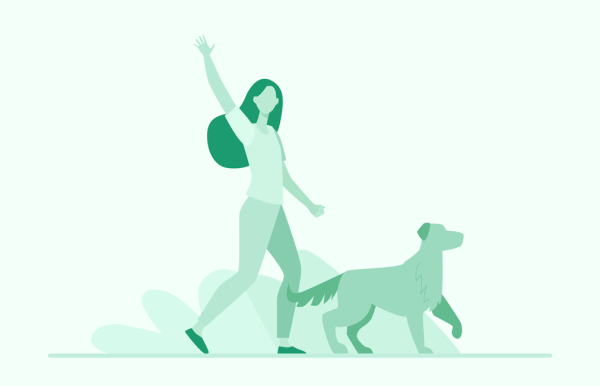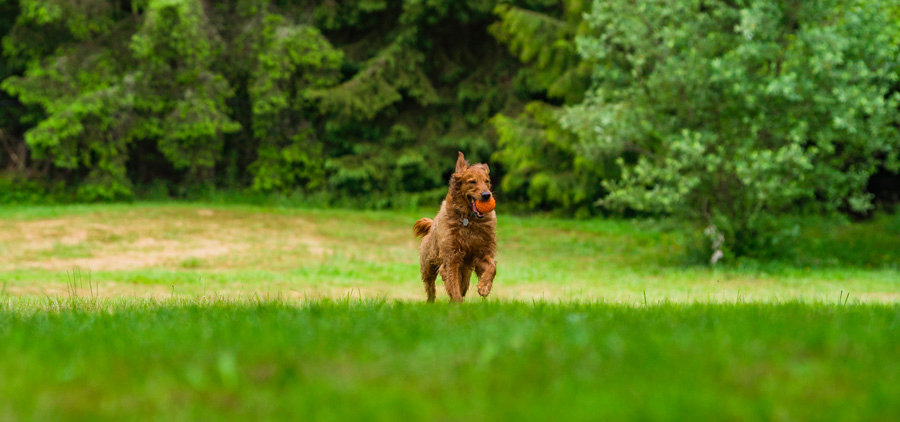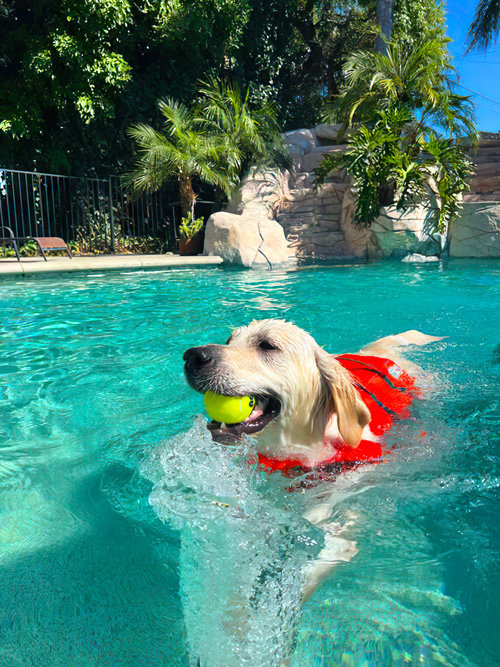How to Train a Barrier Reactive Dog

Dogs that are repeatedly prevented from reaching a desired stimulus, such as other dogs or people, can develop barrier or frustration-based reactivity. This frustration may manifest as barking, lunging, growling, and otherwise making a scene in your yard or while out on a walk.
In this guide, we dive into barrier reactivity (sometimes called barrier aggression) in dogs, exploring its signs and underlying causes.
Most importantly? We equip you with practical insights to help your canine friend overcome their barrier frustration-related struggles!
Barrier reactivity is a form of frustration-based dog reactivity
Frustration-based dog reactivity usually stems from a dog wanting to interact with something (a person, another dog, a specific object) that they can’t.
This is common in social dogs who regularly visit dog parks or attend daycare. They love other pets and get frustrated when they aren’t allowed to greet them! That frustration (especially when being shut behind a barrier like in a fenced yard or held back on a leash) can quickly build into a reactive display. This is why the behavioral problem is sometimes called barrier aggression — an emotional response of frustration can result in behaviors like growling and barking.
Barrier reactivity versus leash reactivity: What’s the difference?
For the purpose of training your reactive dog, barrier reactivity and leash reactivity can be treated pretty interchangeably. Many dogs who struggle with barking, lunging, and growling while on leash also have the same issues when behind a fence!
If we’re being technical, we can define leash reactivity as a type of barrier frustration, since a leash is a type of barrier.
This article talks more about fixing leash reactivity or leash aggression specifically.

Signs of barrier reactivity
Barrier reactivity refers to a range of behaviors a dog might exhibit when they are confined behind a barrier, such as a fence, gate, or leash. So signs of barrier reactivity can vary!
Some common symptoms include:
- Barking or growling: Dogs may bark or growl when they see other animals, people, or stimuli on the other side of the barrier.
- Pacing or jumping: Restlessness, pacing, or attempting to jump over the barrier are signs that a dog is reacting to something outside the barrier.
- Lunging or snapping: Dogs may lunge or snap at whatever is on the other side of the barrier, expressing their frustration.
- Whining or whimpering: Some dogs may show signs of anxiety, distress, and negative associations by whining, whimpering, or vocalizing when confined in a fenced yard, on a leash, or somewhere else where they can't reach what they want to.
- Body language: Pay attention to your dog's body language. Raised hackles, a tense body, and a fixed stare can be indicators of a heightened emotional state and stress level.
- Dilated pupils: Wide, dilated pupils may suggest high arousal, indicating that your dog is reacting strongly to a trigger while stuck behind a barrier.
Causes of barrier reactivity
Barrier and frustration-based reactivity in dogs can be influenced by various factors. Understanding the underlying causes can be helpful to effectively address and manage your dog’s behavior!
Here are some common causes:
Lack of socialization
Dogs that haven't been adequately socialized to different environments, people, and animals may become reactive as a default when faced with unfamiliar stimuli. This frustration can be heightened when behind a barrier.
Lack of training
Dogs that haven't been trained to cope with frustration or taught alternative behaviors may resort to reactive responses when faced with barriers. Note: If your dog is barrier reactive, it does not mean you haven’t done a good job with their training! It can be hard to teach our dogs to appropriately handle frustration, and this is just one of many variables.
Genetic factors
Certain breeds may have a genetic predisposition to reactive behaviors. Understanding breed characteristics — what your dog was originally meant to do — can help tailor training approaches to specific needs.
Territorial instincts
Dogs are naturally territorial animals, and some may feel triggered when they perceive a threat to their territory, such as people or animals passing by their home. This protective behavior may lead to reactivity when they feel confined or restrained especially on their own property.
Medical issues
Pain or discomfort due to underlying medical issues can contribute to reactivity. It's essential to rule out any health concerns through a veterinary examination.
Lack of mental and physical stimulation
Dogs that lack mental and physical stimulation may channel their excess energy into reactive behaviors. Regular exercise and mental enrichment are crucial for a balanced, well-behaved dog.

How to address your dog’s barrier reactivity
Addressing barrier and frustration-based reactivity often involves a combination of positive reinforcement training, desensitization, counterconditioning, and addressing any underlying issues.
Professional guidance from a certified force free dog trainer or behaviorist can be invaluable in developing a tailored behavior modification plan for your specific dog and situation!
Management of triggering situations
We promise we’ll get into the training itself soon, but first: Management is an important part of helping your barrier reactive dog. The more frequently your pet practices their unwanted behaviors in a heightened emotional state, the deeper they ingrain those habits. It’s important to prevent as many reactions as possible so your training can be successful!
Don’t worry — you don’t have to be perfect. Your dog will still react to triggers. You can’t control the whole world. And no one expects you to! Just a little bit of effort can go a long way to managing your dog’s behavior in the meantime, though:
- Use tools like basket muzzles or “ignore me” patches as a visual cue to get more space from strangers while out on walks if your dog struggles with reactions on leash.
- Cover your windows with film or close the blinds to prevent your dog from barking at triggers outside your living room or office windows throughout the day. You can also use household objects as visual barriers.
- Consider playing soothing music for your dog if they tend to hear triggers before they actually see them passing by outside.
- Practice your dog’s basic cues, leash skills, ability to receive reinforcement (like high-value treats) in multiple ways (like from your hand, scattered on the ground, and tossed in the air), and eye contact with you. Building these habits outside of stressful situations will make it possible for you to use them to get through difficult moments out and about. A solid ‘’leave it” cue can be especially powerful.
Exercise
Frustration-based dog reactivity and general overarousal can often be improved by simply addressing our pets’ underlying needs. As mentioned above, it’s possible that your dog is displaying reactive behaviors as signs of feeling ill, in pain, or unfulfilled! You can increase their exercise frequency and type, including activities that let them move their body and use their brain in natural ways.
It’s always a good idea to evaluate your reactive dog’s basic needs before focusing on specific training situations. Even if your dog’s reactivity is driven by more than a treatable health or fulfillment problem, making sure their needs are met will still help you maximize your training success.
Enrichment and fulfillment
How can you help your pet feel more fulfilled in our modern human world? Provide appropriate canine enrichment!
At its simplest, enrichment provides animals with opportunities to satisfy their innate instincts. Common enrichment activities usually give our dogs the chance to safely dig, sniff, and emulate their predatory sequence (searching, stalking, chasing, fighting, celebrating, and consuming) without causing harm to or disrupting the communities we live in. You might fill a rubber toy with peanut butter for them to lick out, focus on playing fun games together, set up structured playdates with dogs you trust, and more.
You can learn more about fulfilling your dog’s natural instincts in our comprehensive guide to canine enrichment. A bonus is that many of these activities can turn into alternate behaviors your dog performs around their triggers in the long run, or you can use them as part of a healthier behavior chain.
Training for long-term barrier reactivity improvement
Observation games
Observation games like engage-disengage and Look At That use counter - conditioning principles to help your dog feel a little calmer and think more clearly around their triggers. These games can be found in Leslie McDevitt’s Control Unleashed books!
Engage-disengage and Look At That methods capitalize on operant conditioning (a learning theory involving animals intentionally performing behavior to earn reinforcement) to create better responses (more agreeable behaviors like looking at you) rather than barking and lunging.
Desensitization
Desensitization involves getting our dogs used to their triggers slowly, in small doses that don’t put them over threshold. While it can be difficult to implement in the “real world” (public environments are often unpredictable and we can’t always decide how far away our dogs are from their triggers) it’s a valuable technique in controlled situations. Distance, intensity and duration matter a lot in this behavior modification technique to help your dog ultimately make a habit of calmer behavior (and lower stress levels).
Further reading and learning
There are countless great resources for how to live with and train a reactive dog! Here are a few that we like.
More Sniffspot blogs on dog reactivity
We have an entire blog category devoted to dog reactivity and related problem or unwanted behaviors. One of our primary goals is to be a welcoming community for reactive dogs — that’s why we have specific rules (like gaps between arrivals and transparency about other animals within view) to keep all Sniffspot visits safe.
Here are a few specific articles:
- How to Train a Reactive Dog: A Beginner’s Guide for everything you need to know to get started implementing a training program for your reactive dog
- How to Socialize Your Reactive Dog for help on how to give your frustrated or otherwise reactive dog positive experiences with other dogs
- Dog Reactivity Chart for help understanding the current level of reactivity your dog shows in different moments
Other dog reactivity resources
- Trainer Patricia McConnell’s guide to how to handle reactive dogs
- CARE For Reactive Dogs is a whole website dedicated to methods and gear for dealing with a reactive dog
- Suzanne Clothier reactive dog training scenario set up
- Trainer Alice Tong’s engage-disengage game (specific to leash reactivity, but can be applied to other types of reactivity as well)
Good luck, and remember: you’re not alone. When in doubt, get in touch with a professional force free trainer you trust. And know you can always bring your dog to a Sniffspot for some playtime without worrying about reactivity triggers!
Trainer Review of this Article
There is so much misinformation out there, and we want to make sure we only provide the highest quality content to our community. We have our articles reviewed by qualified force free trainers.
This is the trainer that reviewed this article:
Emily Fitzpatrick
VSA-CDT
Owner and Head Trainer | Misunderstood Mutt
Most recent articles

Most Dog-Friendly Hotels: The Best Chains for Dogs

The Most Dog-Friendly Airlines For Flying With Your Pup

The Best Dog Toys for Aggressive Chewers (Facts + Infographic)

Are German Shepherds an aggressive dog breed?

Best Dog Rescue and Shelter Contest

How to Deal With Food Aggression in Dogs (Facts + Infographic)
Related articles

Most Dog-Friendly Hotels: The Best Chains for Dogs

The Most Dog-Friendly Airlines For Flying With Your Pup

The Best Dog Toys for Aggressive Chewers (Facts + Infographic)
Top dog guides per area
Dog training guides

How to Deal With Food Aggression in Dogs (Facts + Infographic)
Does your dog ever growl when you walk by their food dish? Maybe they get possessive of treats, carrying them far away and giving you side-eye when you start to approach — or snarling at your other pets or children if they get too close.

Comprehensive Guide to Scent Training for Dogs (Facts + Infographic)
As almost every dog owner is aware, the nose of a dog is an amazing thing. Just as they can pick up sounds we can’t hear, their sense of smell and ability to pick up scents is well beyond ours. In fact, dogs have 40 times the number of olfactory receptors as humans.

How Much Does it Cost to Train a Service Dog?
All Sniffspot articles are reviewed by certified trainers for quality, please see bottom of article for details *

What is and How to Handle Potty Training Regression
* All Sniffspot articles are reviewed by certified trainers for quality, please see bottom of article for details *

Coprophagia: Why Does Your Dog Eat Poop?
Ah, poop. We humans think it’s disgusting… but many of our dogs seem to love the stuff. If you’re wondering why your canine companion tries to eat feces (either his own or that of other animals) you’re not alone!
Dog enrichment guides

The Best Dog Water Parks in the United States
Do you have a water-loving dog looking to burn some energy? There are countless dog parks to visit throughout our country — but some of them become far too hot in the midday sun to be safe for your pets to play. That’s why we’ve put together a list of some of the best dog water parks throughout the United States! At these locations, your pup can frolic, splash, and swim to their heart’s content.

Best Toys for Herding Dogs
* All Sniffspot articles are reviewed by certified trainers for quality, please see bottom of article for details *

The Best Dog Toys for Aggressive Chewers (Facts + Infographic)
Does your dog destroy every toy you give them? Is your house littered with remnants of fabric and stuffing of all different sizes? Are you tired of investing in “indestructible” toys only for your pup to still dismantle (or worse, get bored of) them in just a few days?

Dog Exercise Calculator: How Much Exercise Does Your Dog Need?
You’ve been told that your dog needs regular exercise. There’s a reason “walking the dog” is a classic daily activity: Frequent excursions give your pup a chance to stretch their legs, experience the world, maintain a healthy weight, and spend time with you! Consistent physical activity will also improve their strength, muscle tone, coordination, and mental ability over time.

Complete Guide To Herding With Dogs
* All Sniffspot articles are reviewed by certified trainers for quality, please see bottom of article for details *
Dog reactivity guides

Rottweiler Aggression: Signs, Causes, and How to Handle It
Many dog breeds have gotten a bad reputation over the years for being dangerous. Rottweilers are among them — as a large working breed, they’re often thought of as aggressive.

Dog Reactivity Chart: Understand and Fix Dog Reactivity
Your dog is reactive. They’ll see another dog, person, or other stimulus in the environment (like a car or bike) while out on a walk and suddenly go crazy at the end of their leash. The barking, lunging, and growling feels embarrassing for you — and it’s clear that your pup isn’t having a great time either.

How to Socialize Your Reactive Dog
* All Sniffspot articles are reviewed by certified trainers for quality, please see bottom of article for details *

Definitive Guide: What is Dog Reactivity?
Do you have a reactive dog or suspect you may have one? You’re not alone!

How to Deal With Food Aggression in Dogs (Facts + Infographic)
Does your dog ever growl when you walk by their food dish? Maybe they get possessive of treats, carrying them far away and giving you side-eye when you start to approach — or snarling at your other pets or children if they get too close.
Sniffspot community guides

The State of Public Dog Parks Across the United States
From 2009 to 2020, there was a 40 percent increase in the development of public dog parks. Designated spots for canine exercise have become commonplace in every major city in North America — many pet owners won’t even consider renting an apartment that doesn’t have its own fenced-in pet area for their canine companions.

How This Family is Affording Their Dream Property Through Renting it Hourly to Dogs
Thousand Oaks, California has been a safe haven for Sniffspot host, Jen, since childhood. Having grown up in busy Santa Barbara, Jen, an introvert from an early age, would seek out solitude and serenity away from tourists attractions and droves of people visiting from elsewhere. “My grandparents own 60 acres about a 30 minute drive from here, and I grew up spending every summer and every holiday visiting them on the ranch,” Jen explained. “In Santa Barbara, we wouldn't go to the beach on the weekend because that's where everybody was, so you'd find places off the beaten path where the tourists weren't. For me, the ranch was just my happy place.”

Host Tips: Ellen K. What Makes Sniffspot Successful for Me
Ellen is the host of Country Pasture Getaway, one of Sniffspot's most popular sniff spots. She has taken the time to write up the lessons she has learned about how to be a great sniff spot host.

How this Oregon Farmer is Making a Business From Renting Her Land to Dogs
Just 20 minutes outside of the busy city of Portland, Oregon, and settled right on the banks of the Columbia River, you’ll find what countless visitors have flocked to the area in search of – mountain views, crisp, clean air, and running water for miles. What you might not expect to find, however, is a hidden oasis designed just for dogs and their people, owned and operated by a farming couple and enjoyed by visitors on two legs, and four.

Host Tips: Fran T. Providing Great Guest Service at our Spot
Fran is the host of Ranch Setting, one of Sniffspot's most popular spots. She has taken the time to write up the lessons she has learned about how to be a great Sniffspot host.
Top dog trainers in the US

The Best Dog Trainers in the United States of 2023
Welcome to the United States Sniffspot top dog trainer list for 2023. This is a list of the top dog trainers in the United States based on votes from the Sniffspot community and the general public. Over 55,000 votes were used in compiling this list. We have only included the top trainers with sufficient votes and the trainers are ordered in terms of the number of votes received. Trainers that tied are ranked in reverse alphabetical order based on first name. All dog trainers on this list are positive reinforcement only, as defined by no force, fear, intimidation, or aversive methods used.

The Best Dog Trainers in New Jersey of 2023
Welcome to the New Jersey Sniffspot top dog trainer list for 2023. This is a list of the top dog trainers in New Jersey based on votes from the Sniffspot community and the general public. Over 55,000 votes were used in compiling this list. We have only included the top trainers with sufficient votes and the trainers are ordered in terms of the number of votes received. Trainers that tied are ranked in reverse alphabetical order based on first name. All dog trainers on this list are positive reinforcement only, as defined by no force, fear, intimidation, or aversive methods used. To learn more about our dog trainer contest, feel free to view the dog trainer contest post.

The Best Dog Trainers in Michigan of 2023
Welcome to the Michigan Sniffspot top dog trainer list for 2023. This is a list of the top dog trainers in Michigan based on votes from the Sniffspot community and the general public. Over 55,000 votes were used in compiling this list. We have only included the top trainers with sufficient votes and the trainers are ordered in terms of the number of votes received. Trainers that tied are ranked in reverse alphabetical order based on first name. All dog trainers on this list are positive reinforcement only, as defined by no force, fear, intimidation, or aversive methods used. To learn more about our dog trainer contest, feel free to view the dog trainer contest post.

The Best Dog Trainers in Washington of 2023
Welcome to the Washington Sniffspot top dog trainer list for 2023. This is a list of the top dog trainers in Washington based on votes from the Sniffspot community and the general public. Over 55,000 votes were used in compiling this list. We have only included the top trainers with sufficient votes and the trainers are ordered in terms of the number of votes received. Trainers that tied are ranked in reverse alphabetical order based on first name. All dog trainers on this list are positive reinforcement only, as defined by no force, fear, intimidation, or aversive methods used. To learn more about our dog trainer contest, feel free to view the dog trainer contest post.

The Best Dog Trainers in Florida of 2023
Welcome to the Florida Sniffspot top dog trainer list for 2023. This is a list of the top dog trainers in Florida based on votes from the Sniffspot community and the general public. Over 55,000 votes were used in compiling this list. We have only included the top trainers with sufficient votes and the trainers are ordered in terms of the number of votes received. Trainers that tied are ranked in reverse alphabetical order based on first name. All dog trainers on this list are positive reinforcement only, as defined by no force, fear, intimidation, or aversive methods used. To learn more about our dog trainer contest, feel free to view the dog trainer contest post.
City dog parks guides

The Best Indoor Dog Parks in the United States
Looking for a space to play with your dog no matter what the weather’s like outside? Look no further than our list of the best indoor dog parks in the United States! These climate-controlled spaces are growing in popularity as pet ownership increases throughout the country. As a bonus, many of them also offer dog training, boarding, grooming, or daycare services on the premises.

The Best Off-Leash Dog Parks in the United States
Looking for the perfect place to play with your dog? We’ve got you covered! It’s hard to narrow down, but we’ve put together some of the best off-leash dog parks throughout the country so you can plan your next adventure — along with a checklist of what to bring, what to know beforehand, and some frequently asked questions.

The Best Las Vegas, Nevada Dog Parks
Looking for the perfect place to play with your dog in Las Vegas? We’ve got you covered! Take a look at the best local dog parks and plan for your next adventure in Sin City.

The Best United States Dog Parks
Looking for the perfect place to play with your dog? We’ve got you covered! It’s hard to narrow down, but we’ve put together some of the best dog parks throughout the country so you can plan your next adventure. Here’s what the United States has to offer to its more than 90 million canine companions.

The Best Portland, Oregon Dog Parks
Looking for the perfect place to play with your dog in Portland? We’ve got you covered! Take a look at the best local dog parks and plan for your next adventure in the City of Roses.

















